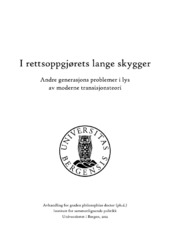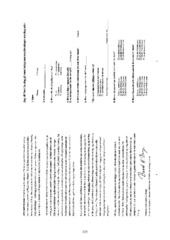| dc.description.abstract | In the long shadows of Norway’s post-war purge: Second generation’s problems in lightof modern transition theory.The first «wave» of transitions from authoritarian rule to democracy in modern times inSouthern Europe in the 1970s and ensuing similar «waves» in other parts of theworld, renewed the field of political science. Analyses of the democratization process inspecific countries focused on the role of key political actors of the old regime and thedemocratic opposition, and on how the actors through the negotiation of pacts could bringabout peaceful regime change.Political scientists also stressed the dynamic nature of modern regime transitions andhow decisions made under uncertainty in that particular context often produce unintendedconsequences. Another perspective associated with modern transition theory is that oftransitional justice (TJ). In this literature, the key question is how new democracies deal withthe past, i.e. the old regime and its crimes. Should victims be compensated, and shouldperpetrators be prosecuted? If so, who should be compensated, who should be brought tocourt, and what are the short- and long-term effects of these decisions? Here, an attempt ismade to study social consequences of post-transitional legal trials empirically.My PhD-dissertation essentially belongs within the TJ-tradition, but the emphasis isnot on ex-perpetrators or their victims but on negative, long-term effects of a post-transitionallegal process as experienced by the 2nd generation: To what extent, and in what ways, havechildren of former collaborators in Norway been affected by unforeseen social consequencesof the extensive legal trials in 1945, after the German occupation (rettsoppgjøret)? Politicaldecisions made with regard to TJ under given circumstances affect the lives of large numbersof people for a long time. In spite of this, transition theory so far largely has ignored thisphenomenon. This dissertation, based on internationally unique survey data, accordingly isexplorative and could be described as a pioneer study both theoretically and empirically.As a point of departure, a model is developed which combines two strands oftransition theory; theories on regime change and on the effects of various forms of TJ: (table not included)From this model, the dissertation's main hypothesis is derived as follows: An elite-controlled transition (from above) brought about by use of force, such as the one in Norway in 1945 (cf. transition type number 3 in table A), typically leads to strict and wide-reaching purges and in the next stage enduring social consequences for the numerous prosecuted and their families. In the thesis I therefore hypothesize that Norway's transition and the subsequent settlement with every single member of the collaborationist party «Nasjonal Samling» (NS) has had a negative and long-lasting effect on the daily lives of many collaborator descendants. In countries where the transition to democracy takes a different form, so will post-transitional justice. Accordingly the long-term social effects caused by regime change should also be different from the Norwegian example or similar cases.The bulk of the thesis consists of six separate but closely related articles that highlight selected aspects of the post-transitional purge and test empirical hypotheses on different consequences for the approximately 100 000 NS-children, i.e. Norwegians whose fatherswere once sentenced for treason. The first article (Al) looks at the power relations, key actors and main principles that formed the Norwegian purge in 1945 and argues that the legalprocess intensified the stigma attached to ex-collaborators and impeded society's willingness to reconciliate itself with at the individual level. Findings also indicate that negative effects, as expected, persevered for many years after 1945. Thus, the two predictions from my main hypothesis; that many NS children were affected and for a long time, were both supported by the data.While the 2nd generation over the years became less exposed to stigmatization (A5), the psychological stress of being the child of someone sentenced for treason has been more enduring, and is still felt today by NS-descendants (A3). A series of «social mechanisms» accounted for a great deal of variation within the 2nd generation sample. Specific characteristics of an NS-child, its parents or the local environment were associated with a greater susceptibility to some of the problems. Notably and counter-intuitively, negative effects were generally independent of whether the respondent's father had been an active collaborator or a «passive» NS-member. Another counter-intuitive result regards variation in mental health: Contrary to previous findings, men did not report significantly fewer stress symptoms than women.In the concluding article (A6), my model is first elaborated and then tested by way of a comparison between results from my Norwegian survey and main tendencies found in international literature on the post-war experiences of German and Austrian NS-children.This dissertation contributes to the literature on TJ in two ways: First, my case study develops four new theoretical concepts: i) «Transitional injustice» refers to unfairness created by TJ decisions, ii) «transitional depowerment» denotes the marginalization of those who are prosecuted after the transition and iii) «transitional empowerment» is the multifaceted,positive effect of belonging to certain groups after the fall of the old regime. The fourth and last concept, iv) «transitional victimization», refers to negative consequences of democratic transitions for others than those who are charged for their own actions during the old regime.Secondly, my work also draws attention to how the essentially unpredictable nature of the transitional process is associated with a considerable risk for unintended, social consequences of different forms of TJ, consequences that transition theorists have largely failed to explore.them. In the second article (A2), the purge and the ensuing lack of collective reconciliation in Norway is analysed in the light of modern TJ-theory and compared to recent examples of post-conflict tradition-based reconciliation in sub-Saharan Africa. The next three articles (A3-A5) all use quantitative data, mainly from my own survey among children of former NS-members, to examine possible unintended consequences of Norway's post-war purge with respect to mental health (A3), paternal relationship (A4) and stigmatization (A5).Results from my survey suggest that most 2nd generation descendants, as expected, experienced problems in one or more of the three areas but also show considerable variation. | en_US |


